We all remember the wonderful Soviet film "Scarecrow" about the girl Lena Bessoltseva, who became a victim of aggression and psychological pressure from her classmates. Fans of American cinema may recall the film "Carrie" based on the novel by Stephen King on this topic, where the main character, due to her extraordinary appearance and psychological characteristics, becomes the object of bullying and cruel jokes of her peers. Bullying at school is an increasing problem of communication between children with each new generation. If you start to combat this phenomenon as early as possible, bullying can be minimized or eradicated.
All this is about bullying at school - bullying, intimidation, bullying. The word is new, the phenomenon is old., one in ten schoolchildren in the world are exposed to school violence, and this figure is growing every year. In the media, we increasingly come across frightening headlines: "teenagers posted a video of beating a classmate on the network," "a girl committed suicide due to bullying at school."
The problem of bullying is a modern, acutely social one. One should not turn a blind eye to her, because childish cruelty sometimes goes beyond all permissible boundaries.
This article is for parents, children, teachers, for those who had to deal with bullying and bullying at school and for those who want to protect their child from this horrific phenomenon of our time.
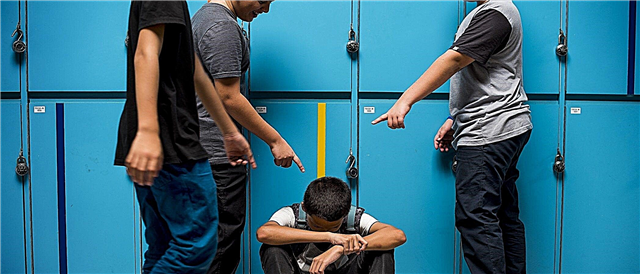
What is bullying
Travlya (jarg.Bulling - English bullying) - aggressive persecution of one of the members of the collective (especially the collective of schoolchildren and students, but also colleagues) from the other, but also often a group of people, not necessarily from one formal or recognized collective. The persecution is organized by one (leader), sometimes with accomplices, and the majority remain witnesses. With bullying, the victim is unable to defend himself from attacks, thus bullying is different from a conflict, where the forces of the parties are approximately equal. Bullying can be both physical and psychological. It manifests itself in all age and social groups. In difficult cases, it can take on some features of group crime. wikipedia
The concept of "bullying" appeared in the XX century. But it acquired its modern significance relatively recently, thanks to the author of the book "Bullying in School", Norwegian professor of psychology Dan Olveus.
The professor conducted the first study on school bullying among schoolchildren in Norway and Sweden. It turned out that 15% of children regularly face a situation of bullying, 9% of those surveyed are victims, 7% are aggressors, and 2% are in both roles.
But the data of a modern study conducted in the USA in 2016: 13% of schoolchildren were subjected to verbal bullying, 12% became objects of gossip, 5% were subjected to physical violence and 5% were excluded from communication.
In simple words, bullying is intimidation, bullying, bullying - this is the aggression of some children against others, when there is an inequality of power and the victim shows how much it hurts her.
Types of bullying
- physical - direct physical actions in relation to the victim (shocks, kicks, beatings, sexual harassment);
- verbal - threats, insults, ridicule, humiliation;
- socio-psychological - bullying aimed at social exclusion or isolation (gossip, rumors, ignorance, boycott, manipulation);
- economic - extortion or direct selection of money, things, damage to clothes;
- cyberbullying (from the English - cyberbulling) or Internet bullying - bullying on the Internet through social networks, e-mail. It involves spreading rumors and false information, hacking personal pages, sending negative messages and comments. It is the youngest and most dangerous type of bullying, as it is very difficult to defend against it and find the sources of the threat. There was even such a thing as bullicide - a siucide committed due to bullying on the Internet. The most famous case occurred in the USA in 2006. The mother, together with her thirteen-year-old daughter, carried out the persecution of a minor acquaintance on the MySpace social network under a fake profile. The girl could not stand the bullying and committed suicide.
Who is involved in the bullying
Bullying usually involves the victim, the aggressor and bystanders, i.e. participants in bullying.
Victim
There can be absolutely any reason for bullying. The most common victims are children:
- with physical disabilities or developmental features (reduced hearing or vision, cerebral palsy, etc.). Suffering from diseases that distinguish them from the team;
- unsure of themselves, withdrawn, with increased anxiety and low self-esteem;
- with features of appearance (freckles, fullness / thinness, etc.);
- with low intelligence and learning problems, poor students;
- “Favorites” of teachers or, on the contrary, outcasts.
- round excellent students;
- physically weak children;
- children overprotected by parents;
- sneaks;
- children of teachers;
- do not have modern electronic novelties or have the most expensive ones, inaccessible to other children;
- geeks;
- children with a non-trivial worldview that differs from the standard one ("white crows");
- children of poorly provided (poor) parents;
- representatives of national minorities;
- representatives of sexual minorities.
What unites all victims is the inability to resist the offender, to defend themselves, to fight back.
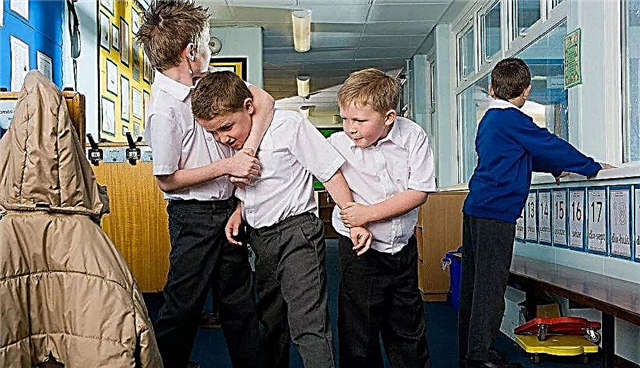
Aggressor
A potential buller is a person:
- with low self-esteem, which he seeks to raise at the expense of humiliating others;
- striving to be the center of attention at any cost;
- aggressive, cruel, prone to domination and manipulation;
- more often with problems in family and parent-child relationships.
The aggressors can be children from both dysfunctional families and families with a high financial situation.
Observers
This is the largest category of participants in school bullying. Observers are those people who become involved in a bullying situation. As a rule, there are three options for the development of events.
- Or the observer rises to defend the victim, finding himself under attack and risking becoming a new victim (remember the boy from the movie "Scarecrow", who defended Lena Bessoltseva).
- Or the observer takes a passive position, not interfering in the conflict.
- And the third option is when the observer actively encourages the aggressor and after some time joins him.
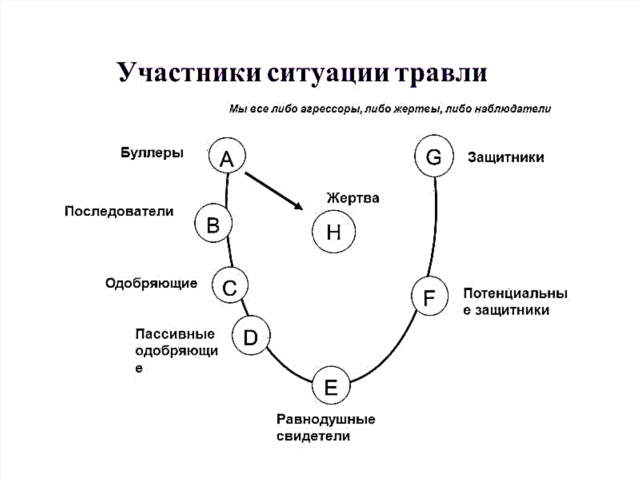
Unfortunately, in a bullying situation, it is useless to take a detached position. Even if only one classmate is attacked and your child is "not concerned", observers receive no less, and sometimes even more trauma.
In psychology, there is even a term "observer trauma". Often, the child is unable to cope with the experience of witnessing ongoing abuse on his own.
Bullying damages not only the victim's mental health but also children who are in the position of silent bystanders.
Impact of bullying on its participants and consequences
Now let's trace the impact of school bullying on each of its participants.
What does an aggressor get in a bullying situation? Again, the feeling of one's own "coolness", impunity, "omnipotence." In the future, this leads to an even greater development of destructive, i.e. personality-destroying qualities, deviant behavior and, as a result, registration with the Commission on Minors' Affairs and Problems with the Police.
What do bullying watchers get? Shame and guilt for not helping the victim showed weakness.
And, of course, the worst psychological trauma is inflicted on the victim of bullying. Even after many years, as adults, victims remember all their painful experiences associated with bullying.
Psychologists note that school bullying is comparable in severity to the mental health consequences of domestic violence.
- The victim of bullying begins to show psychosomatic disorders: frequent headaches, problems with sleep and appetite, chronic diseases may worsen.
- Plus to this - depressive disorders, increased anxiety, neurotic manifestations.
- And the most serious reactions to bullying are attempts at suicide or school shooting, when a child can no longer tolerate ridicule and bullying and decides to take revenge on the offenders using explosives or cold weapons.
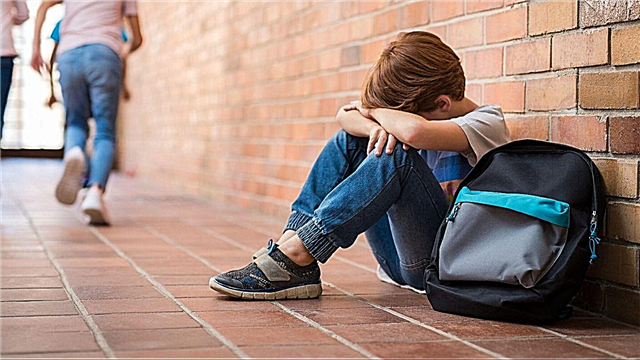
How to recognize bullying and why it is dangerous
If a child has become a victim, but does not talk about it directly, bullying can be guessed by other physical and psychological signs.
- Unreasonable pain in the abdomen and chest;
- Unwillingness to go to school and poor performance;
- Nervous tics, enuresis;
- Sadness, restlessness, anxiety;
- Disturbed sleep, nightmares;
- Long-term depressed state;
- More frequent colds and other diseases;
- Inclination to solitude, unwillingness to communicate;
- Appetite problems;
- Excessive compliance and caution;
- Tires quickly and cannot concentrate;
- Closes in himself, becomes touchy, often repeats “you don’t understand me!” ...;
- Often follows the lead of other children, is afraid to express his own opinion;
- Bruises, torn clothes and a briefcase, "lost" things are common;
- The child avoids crowds, group games, circles;
- The child has no friends;
- During recess, the child tries to stay close to adults;
- Afraid to go to the board;
- No desire to go to school or extracurricular activities;
- Doesn't visit friends;
- Constantly looking for excuses not to go to school and became often ill;
- The child goes to school by different routes;
- Pocket money is often lost;
- Returns from school depressed;
- Never mentions any classmates;
- She talks very little about her school life;
- Doesn't know who to call to learn lessons, or refuses to call anyone at all;
- Lonely: no one invites him to visit, to birthdays, and he does not want to invite anyone to him.
What to do for a child victim of bullying
Now I want to turn to the children:
- If you are bullied at school, they call you names, spoil your clothes and things, be sure to tell an adult about it: parents, teacher, senior friend. Remember, asking for help is not a weakness, but a decision of an adult in trouble.
- Do not be afraid that "it will be worse" if you tell someone about what is happening. It will be really worse if you are alone with your problem. There will always be someone who is stronger than your offenders and can protect you.
- If you are being bullied on the Internet, be sure to save all correspondence, videos, and voice messages in order to use them later as evidence of the cyberbullying being committed.
- If the subject of bullying can be corrected, correct it. If you can't, don't consider yourself guilty.
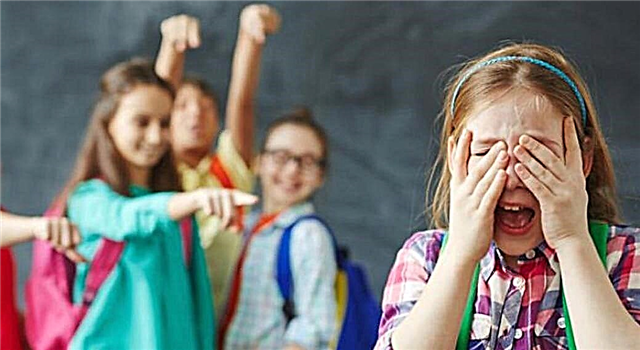
How NOT to do
- Argue aggressively or respond in kind;
- Threaten the buller;
- Pretend you don't care or that you're funnywhen it is not;
- Run away, hide, cry, complain.
How to do
- Calmly shrug and smile;
- Ask a counter question ("Do you think so?");
- Agree (“Yes, I have shortcomings, I myself (a) know about them”);
- Allow to think so ("This is your opinion").
The most important thing is to understand that the bully's words and actions do not change the victim of bullying in any way and that indifference to attempts at bullying is what will put the buller in a stupor.
Parents whose children have experienced bullying at school
Now, here are some tips specifically for parents whose child is being bullied at school.
The first and most important point is to remove the feeling of guilt from the child!
Explain that he is not to blame for being bullied. The child is in no way worse than others, he just found himself in a difficult situation for himself, from which parents and teachers will help him find a way out.
After that, you can normally talk about what happened to your child. Here are phrases to help you start a dialogue.
- «I believe you". This will let the child know that together you will cope with the problem.
- «I'm sorry it happened to you". This is a signal that you share his feelings.
- «It's not your fault". Show your child that he is not alone in this situation, many of his peers are faced with different options for intimidation and aggression.
- «It's good that you told me about it". Prove that the child did the right thing by contacting you.
- «I love you and will try to make sure that you are no longer in danger". This phrase will allow you to feel protected and look forward to the future.
Always try to maintain a relationship of trust with your children so that they can ask for help in case of school violence in time.
- Let your child know that you are on his side. Support and reassure: “It's good that you told me everything! I believe you. It's not your fault what happened. I will help you".
- Talk to him with confidence about the situation. Explain to him the further actions and the line of behavior.
- Help your child gain self-confidence and the ability to resist attacks from peers.
- Talk to the homeroom teacher, educators, parents of your child's abuser.
- If the situation is serious and cannot be resolved peacefully, consider transferring to another school or class. Again, this is an extreme case, since the same thing can happen in a new place.
- In a cyberbullying situation: if the bully is known, block messages from his address or complain to the site administration. If the aggressor remains anonymous, print out the correspondence, take screenshots of pages with videos and photos, and go straight to law enforcement agencies.
The task of parents is not only to protect and support a child facing a bullying situation, but also to teach him correct, healthy communication with people around him. In everyday life, it is very difficult to avoid facing evil, cruelty and aggression. The child must learn to say "no", not to succumb to the provocations and manipulations of his comrades, to know that it is sometimes more correct to devote adults to his problems than to understand on his own, and be sure that his relatives will not dismiss him, but will help and support in difficult times.
Educator-psychologist Olga Tkachuk told how to recognize the problem in a timely manner and deal with it correctly.
- Bullying is a very fashionable word nowadays. They are often called any conflict that occurs in the children's team, when someone insulted, called, hit someone. But not every fight is bullying.
Yes, bullying begins with isolated episodes of psychological or physical abuse. But whether these isolated or even recurring cases become permanent, long-term and systematic (and this is what distinguishes bullying from conflict) depends on how long the victim will endure and hide his feelings and how the environment will react to this.
The signs of bullying are inequality of power of the participants, aggression, deliberate character on the part of the instigators and an acute emotional reaction of the victim (the person suffers from what is happening).
In my work as a school psychologist, I came across isolated episodes of attacks on a child's personality, but this topic was stopped at the very beginning, picked up by parents and / or class teachers, administration, a psychologist, and did not get to bullying. It is important here that in the school itself there is a clear rule at the forefront: in our country, violence and bullying are unacceptable and are stopped immediately. This rule should be shared by all adults - from principal to teachers.
Appeal to the teacher
Talk to psychologists and teachers. You can contact them directly at school or at an NGO.The main thing is to convey that this is a common problem that you would like to solve, and not make claims.
If talking doesn't help and the school can't protect your child from bullying, you can sue. Use the Code of the Russian Federation on Administrative Offenses ().
In case of physical violence, it is necessary:
- Stop taking your child to an educational institution;
- Collect evidence (health certificates, damaged things, screenshots of correspondence, and so on);
- Write a statement to the police prosecutor's office;
- Contact the officials (local Department of Education, Rosobrnadzor, Ombudsman for the Rights of the Child);
- Attract public attention.
What should a teacher do
The problem of bullying at school and in the classroom is a separate big topic. Here is just one example of what a teacher can do.
Situation: two girls boycott the third. The teacher, having obtained the consent of the victim and her parents, organizes a meeting with the initiators of the boycott and four other children who took a neutral position. The teacher explains to the children how the girl is feeling and asks them to come up with two or three possible solutions to reduce her suffering. Feeling the importance of their mission, children are actively involved in the "project". Once a week, all participants meet and talk about their successes. After a few such meetings, the situation, as a rule, exhausts itself.
However, unfortunately, not all parents find support from the school. Then almost the only "option" is leaving for family education. It's just that changing schools doesn't always work, as bullying can happen again. During family teaching, you will have ample time to discuss traumatic experiences with your child.
Help a victim of bullying
1st method... "Collection of virtues". When someone behaves aggressively towards a child, physically or mentally, his self-esteem falls seriously. Therefore, one way to help a child is to make a list of his good qualities that will set him apart from the crowd. The next time a child meets a bully, a list of his positive traits pops up in his head.
- So I see the picture: against the conditional Vasechkin there is a conditional Petechkin with his fists, and Vasechkin proudly recalls: “Ah! I’m such a fine fellow, I am well versed in Bach! ”
- Not so primitive. It's just that if a child knows his own merits, he has no internal anxiety - I mean nothing, I don't know how ... And such confidence affects his behavior in conflict situations.
2nd method. Observe the principle of an impenetrable wall. We tell the child: imagine that you are surrounded by an impenetrable wall. There, behind her, someone is shouting, making noise - but you don't seem to hear him. You can even stick your headphones in your ears and pretend you're listening to great music.
- Uh-huh, and how will our Petechkin pull out these headphones and even tear them ...
- It will not dare if you do it with a sense of dignity (and you already know what list of virtues is inside you). However, this is really advice not for everyone, but for those who have good exposure.
3rd method... "Problems of the offender." Suggest to your child: imagine that everything that the offender says refers not to you, but to him, to the bully's personal problems. Because a person who has order in his head is unlikely to behave this way. And the child begins to see and assess the situation in a different way, and even his body begins to emit different smells! After all, if you look into psychophysiology, when a person strains, he smells of sweat. If he is constantly in suspense, then the smell is constantly with him. You know: if a person is afraid of a dog, she feels it. The same is in the human world. At the level of the laws of nature, we are all one.
4th method... "The pachyderm elephant technique." We learn to self-hypnosis: "I am an elephant, I am thick-skinned, and everything offensive that they tell me bounces off me like a ball." Don't dwell on resentment. The more upset the victim is, the more interesting the tyrant is.
5th method. Teach children to parry attacks. For example, a bully at school says to a classmate: "you are scary", and she replies: "and you are so cute." The offender to her: "you are a fool", and that - to her: "you know better, you are smart" ...
The point of these methods - thick skin, parrying - is to prevent the offender's words from entering your territory. As soon as you allow it, you begin to believe in what was said and also become an involuntary player in bullying.
6th method... Play board and team games with children. So that the process of the game itself is important for the children, and not the opportunity to win.
7th method... Let your child realize himself, train his strong side. For example, circles in which he will assert himself, where his self-esteem will grow.
Parent Handbook: How to Stop Bullying
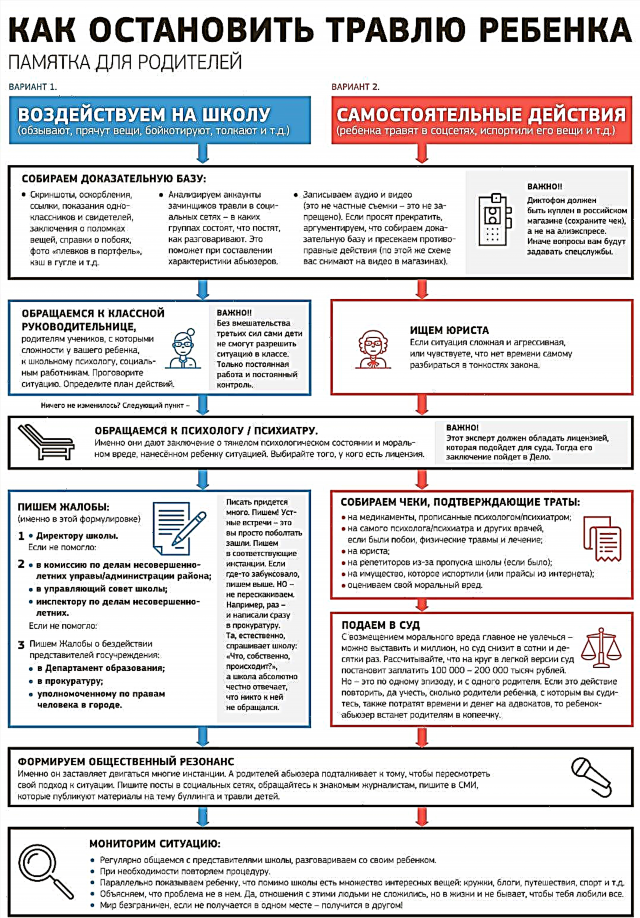
From personal experience
"High school students attacked my son"
Regina Beseda, a mother of three, shared a story when she herself had to stand up for her son.
- I learned from the general school parental chat on the social network that my boy (he was in 8th grade) was beaten by 10th graders. The elders decided to punish the younger ones for making too much noise. They took out the belt, hit the boy. It turned out to be my son.
The classroom told me: they will figure it out themselves. How?! Grades 10 and 8 cannot figure it out on their own - they have different interests, physical parameters. Therefore, a meeting was made, there was the whole company of high school students, teachers of both grades and representatives of the 10th grade parent committee who ... came to fight with the 8th grade students! They tried to accuse the guys: they almost beat themselves. From which I once again concluded that the problem of children's behavior is a problem of parental behavior.
Then I said that I would write a statement - immediately to the prosecutor's office - about moral and physical violence. And what will it say about a teacher who allows such class behavior. And about parents who encourage this behavior of their children. The conversation immediately took a different direction. That is, as soon as we stutter about the legal side of bullying (and bullying in the West is a legal term that implies punishment), the question is settled. Parents began to look for options - how to interact, how to make their children friends ...
What to do if your child is a buller
Most often, bully children become victims of domestic violence, as well as those who have experienced traumatic moments in the past. If the father hits and humiliates the boy at home, then with a great probability the next day he will try to recoup the weaker classmates. Such a child undoubtedly needs the help of specialists, but the main thing is to analyze what is happening in your home.
But there are times when the buller has high self-esteem, coupled with reduced empathy and is fully aware of his actions. Such a child needs rigid boundaries and understandable consequences of his actions. Talk to him about it. Share your experiences as a victim or aggressor.
Pay attention to the child's environment: if he is being abused by older friends (sometimes constant sarcastic remarks are enough).
Finally, go to a family counselor to help everyone figure out what's going on. It is often impossible to do this on your own.
How to behave in a child in whose eyes someone is constantly offending
It depends on the resources, the strength of this child. The most risky and daring way is to defend yourself, to say that this is unacceptable. There is no such resource - to tell an adult about what is happening (to your parent, teacher, psychologist).
Why are children often afraid to tell adults about it?
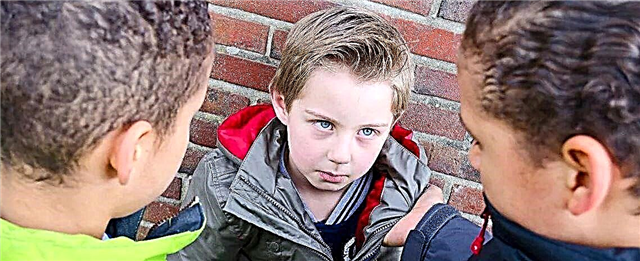
There are several reasons here. It can be an unformed or broken trust between parents and a child, and the child's unwillingness to "traumatize" the parents with his problems, and his own negative experiences that are simply paralyzing (fear, shame, guilt).
There is also a myth in our society that asking for help is a weakness. You have to deal with everything yourself, asking for help is humiliation.
Often the children themselves who have been bullied share this rule. "Mom, don't bother, I can handle it myself", "they will laugh at me if I complain to someone." Or perhaps they already had a negative experience when they trusted, and the adults "ruined everything" - for example, they devalued, did not take into account the teenager's experiences, or shrugged it off.
Trust is a very fragile thing. And it is important that in the immediate environment of the child there is at least one adult whom he trusts.
Preventing school bullying
Due to age, a child cannot protect himself from bullying. This is the work of adults. However, there are basic things that adults should explain to him to prevent bullying in the school environment.
- Talking about bullying to trusted adults is correct, it is not snitching.
- You need to build self-esteem and behave confidently. Be persistent and strong (at least outwardly).
- You cannot hope to get revenge with more cruelty. This will lead to new problems. Better to look for friends among peers and use the most powerful weapon against aggression - humor.
- It is necessary to avoid situations in which bullying is possible and reject offers to participate in it.
- If you witness violence, you should immediately bring someone from the adult or advise the victim to go to a parent or teacher whom she trusts for help.
It is better to prevent any phenomenon than to eliminate its consequences, and school bullying is no exception. Violence prevention in schools lies in the correct attitude of adults to these problems.
Dear teachers! You have no right not to know what is happening with your wards and turn a blind eye to the aggressive "antics" of teenagers. Any information about the manifestation of violence should be checked and taken into account. In addition, it is necessary to pay attention to the formation of groupings in the class and the allocation of "outcasts" and "white crows". You also browse the personal pages of your students on social networks, pay attention to posts and comments. Nobody calls on you to violate the inner space and to get into the personal life of your wards. But you must prevent, prevent violence and aggression and protect the weak. Organize activities to rally the children's team, joint trips, excursions, trips. Engage a school psychologist and social educator to prevent bullying, cooperate with families - do not remain indifferent!
Dear Parents! Tell your children about the phenomenon of bullying and how you can protect yourself from it. Explain that telling an adult about your problem is not a weakness, but a wise decision.
Guys! You are just starting to live, and in modern life you can find not only good, but also a lot of evil, cruel, and wrong. Learn to be stronger than evil, to say “no” when you are forced to do something bad, to repulse the offender, without losing your own dignity. Find friends with your interests, communicate with those who will respect and value you.
And finally
Now you know everything or almost everything about bullying at school. Yes, the modern world is really cruel and dangerous. And the main danger lies in ourselves. Therefore, we must not close our eyes to what is happening. At the slightest sign of bullying - sound the alarm, look for ways to help and resolve the situation.
If you are faced with bullying at school, you need to seek help. Every day, under the burden of fear and humiliation, worsens your state of mind, takes strength and undermines basic trust in people. You can stop it. You can. If you feel bad, do not bear it.
And in conclusion - a video about how important it is to help a child who is a victim of bullying in time, to protect it in time, not to be late….
Social video. Try not to cry ...
Real stories of school bullying and how to deal with it
We created a small survey and were surprised how widespread bullying is. Read the stories of school children - maybe one of them will help you stop bullying!
Asya:
They were poisoning because of the big forehead! The way out is to change your perception of beauty, work with self-esteem and develop the ability not to waste emotional resources on stupid people. In general, the best remedy for "stupid" bullying is growing up, because both sides gain intelligence.
By the way, if you need to fight bullying here and now in a certain situation, then personally for me the best way is this: instead of being shy / resentful / silent, or attacking in response, or, as some advise, laughing with the aggressor, you can try to tell the person directly and calmly: "This is offensive / it hurts me / I hate to hear this / don't say that, please, it upsets me."
In short, the trick is that the aggressor achieves these feelings, so such a response can confuse him.
Dima A .:
I would not say that I got badly from bullying - I did without assault. But it still left a wound - mockery, jokes and the like. I fought just by starting to google the answers to my questions.
This is what helped me gain confidence and resist resentment. After a couple of years, having stopped reacting to insults and joking about them, I gained authority in the class, and later my word began to carry weight. Perhaps I was able to overcome bullying because people themselves grew up.
Olga K .:
In the seventh grade, in a laboratory work in physics, she broke a measuring cylinder. And that is because the stand was deformed. Teacher said I was talentless, stupid and armless. With the whole class, I made everything clean up. Said to bring two cylinders as punishment.
I proudly and silently brought four the next day. He apologized, but quietly and at recess. The sediment and the pop-up "talentless, stupid, armless" during the failures have remained until now, and after all, it's not a schoolgirl for a long time ... At such moments I restrain myself from self-flagellation. I tell myself that the cruelty and non-pedagogical behavior of this person is a consequence of narrow thinking and stupidity, and has nothing to do with me, much less speaks of my professional qualities and “handlessness”.
Vladislav K .:
He began to roflate those who roflate me, and stopped responding to their jokes cordially.
Tanya K .:
There are a lot of people in our school who cannot assert themselves at the expense of their knowledge, therefore, they assert themselves at the expense of humiliating their peers. Many people advise simply not to pay attention to the insults, but this behavior will not always stop the offender. In my case, this did not help.
If you can't just keep quiet, you have to act. But how? You definitely can't answer them in their own manner. "If a dog barks at you, you don't get on all fours and start growling at it," these are words that should be remembered forever.
I did the following: when my offenders once again tried to insult me, I silently listened to everything they wanted to tell me, and then simply asked the question: "Why did you say that?" After that, the offenders are lost in thought, they are unlikely to have a decent answer. If the incident occurs again, it is worth doing the same. Over time, the person will understand that you are confident in yourself, and will cease to assert himself at your expense.
Daniel M .:
There was rudeness and threats from the teacher. Something like this: “Where did you come from? If you open your mouth, you will be kicked out for grades. "
Apparently, she felt her impunity. Dictaphone recording helped. The situation was resolved by talking with the director and the school administration.
Tatiana Y. (mother):
For the third year in a row, at the beginning of the course being studied, children in the very first quarter are given quarter deuces. Then the children only hear from all sides that they are Losers and nothing shines for them.
As a result, one child, quiet and calm, stopped learning altogether, and the second, proud, became so harsh and aggressive towards the teachers that they prefer not to hurt him anymore and peacefully put a three. Here, by the way, are examples of successful and unsuccessful resistance.
I had to contact the director and the district education department. It seems that something has begun to change. But maybe it just seems
Since for some reason we cannot change schools, some advise to threaten with actions to question the professional qualities of teachers.
Olga Shch. (Mother):
The son went to karate. All questions at school were quickly over.

 - Bullying is a very fashionable word nowadays. They are often called any conflict that occurs in the children's team, when someone insulted, called, hit someone. But not every fight is bullying.
- Bullying is a very fashionable word nowadays. They are often called any conflict that occurs in the children's team, when someone insulted, called, hit someone. But not every fight is bullying.

